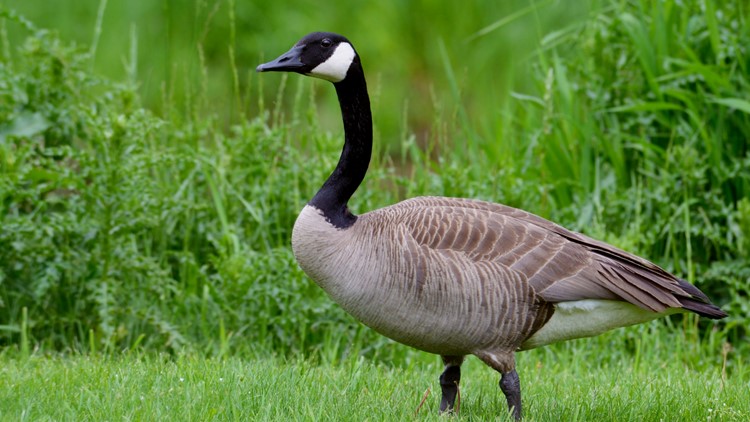LANSING, Mich — A long-standing policy designed to control the Canada Goose population in Michigan has added a new option to control the geese population.
For years, the Wildlife Division of Michigan's Department of Natural Resources (DNR) has worked to resolve human-goose conflicts using several different methods. But one method that was rarely ever used could begin to become more commonplace: euthanasia.
Beginning in 2025, the DNR will allow property owners—when all other options are exhausted—to request the round-up of Canada geese on their property to be euthanized or processed for donation to charities. Prior to this policy change, the DNR would just relocate the geese if a roundup was requested.
"Just the sheer number of birds that we've been relocating in the recent past, as well as disease concerns not having suitable places to put them, and also just this concern of moving a conflict from one area to another. Those are all reasons that we have decided not to do the relocation anymore," Said Barbara Avers, Waterfowl and Wetland Specialist for the Michigan DNR Wildlife Division.
But before it comes to euthanasia, Avers said that other options would need to be exhausted first.
"We do require folks that are interested in these pieces of the program to actually try some of the nonlethal techniques," Avers said. "Think of harassment techniques, scare tactics, some landscape alterations. We do require and ask people to try those different strategies first, and then if those don't work, then this program is available for them."
The Resident Canada Goose Management Program is also updating its permitting, changing the cost and availability of its two permit options: Nest and Egg Destruction Permits and Goose Roundup Permits.
Nest and Egg Destruction Permits can be requested to allow landowners to destroy Canada goose eggs and nests on their property. The Michigan DNR said this method encourages the geese to migrate north to molt.
In years past, the Nest and Egg Destruction Permits were only available for certain locations in Michigan, beginning in 2025, they will be available across the state to eligible applicants.
To apply for a Nest and Egg Destruction Permit, you must have tried non-lethal approaches as well as attend training. Applicants also have the option to hire a contractor to perform the service instead of attending the training.
"The idea is, right, get those eggs before they hatch, and that can help reduce some of those local populations," Avers said.
Goose Roundup Permits will be available in 2025 only after all other options are exhausted and after certain eligibility requirements are met. The Michigan DNR will need to see:
- That there is a human health and safety concern.
- That the site meets a minimum number of geese requirement.
- The applicants have conducted a nest and egg destruction program under permit.
- All non-lethal harassment techniques have been tried.
Avers said that the permits may also be granted in specific cases like an E coli outbreak on a public beach.
"That may be a situation also where, if there's documentation from the local health department, you know that that says there's elevated E. coli counts in the water, and that it is due to the presence of the large numbers of Canada geese there. That would be like another way that sites would be eligible for this program," said Avers.
The United States Department of Agriculture – Wildlife Services (USDA-Wildlife Services) will be in charge of conducting the roundup efforts. USDA-Wildlife Services will be in charge of euthanasia, contaminant testing and meat processing and distribution as well.
"While USDA-Wildlife Services can do the roundup. They can also do the euthanasia. They're equipped to do that. They're also equipped to do the disposal of carcasses, or taking them to a processor, you know, getting contaminant testing done on the meat, being able to hold the meat and distribute the meat," said Avers.
Canada geese are protected by federal law and cannot be harmed without a permit.
The Michigan DNR that the Canada goose population in the state has peaked at over 300,000. The current management goal for the Canada goose population is between 175,000 and 225,000.
Hunting of Canada geese is allowed during the waterfowl hunting season. You can learn more about waterfowl hunting in Michigan, here.



